Heroes of Might & Magic
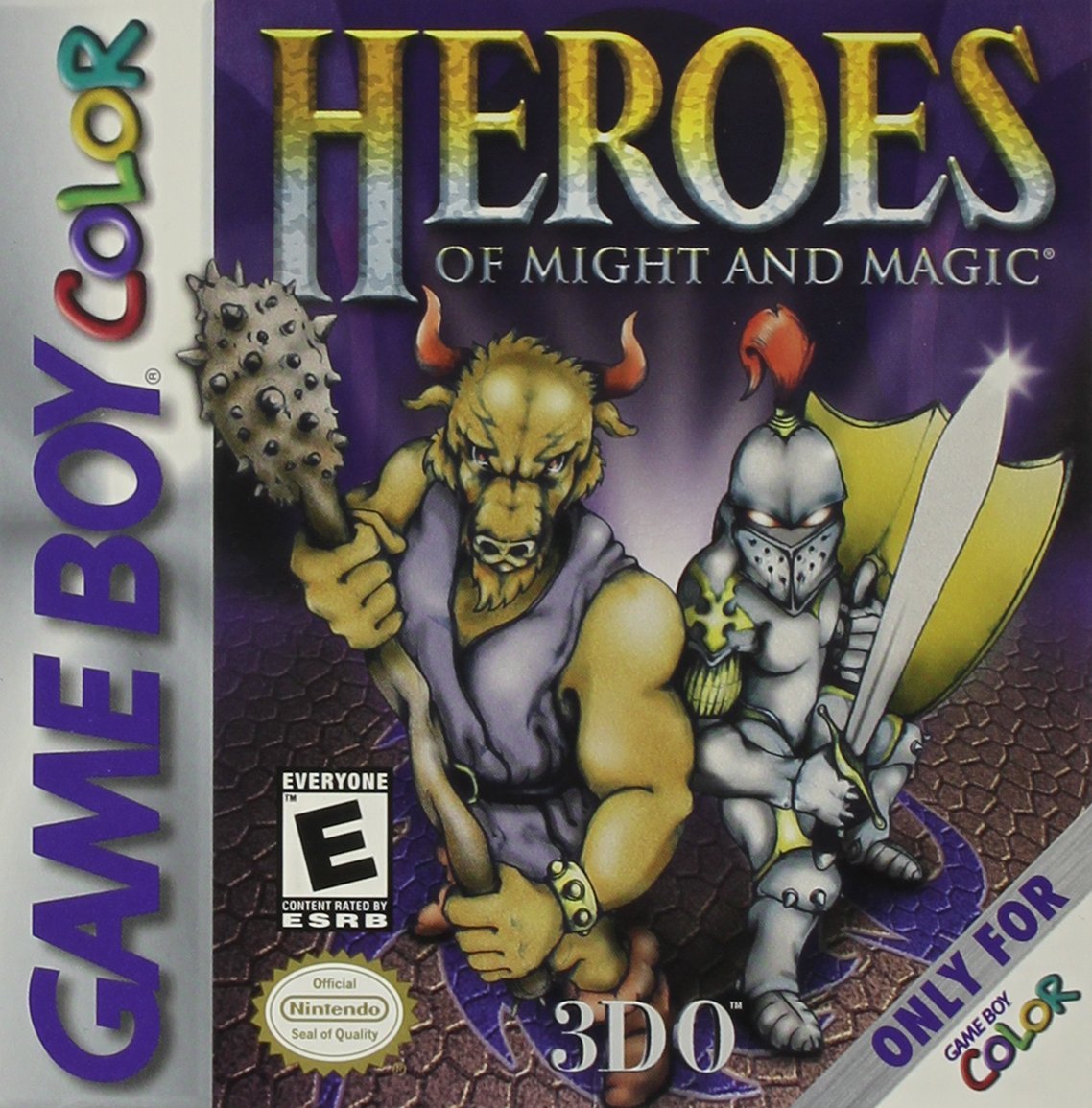
- North American release in June 2000
- European release in October 2000
- Never released in Japan
- Developed by KnowWonder
Buy, Move, Attack, Rinse, Repeat

Heroes of Might & Magic is the textbook example of what Game Boy Essentials is about. If you look at lists of best Game Boy games of all time, that game will never be on there. But it is very essential to play Heroes of Might & Magic to understand a small part of the Game Boy Color’s library: the let’s do something you didn’t think could be done type of games. Games like Warlocked, Alone in the Dark or the unreleased Tyrannosaurus Tex were all trying to cram Real-Time Strategy, Third Person Horror or First Person Shooter gameplay on Game Boy Color with limited success. Also of note is the unreleased Katakis 3D, an ambitious space shooter that was recently unearthed. Heroes of Might & Magic was part of that overall trend happening near the end of the Game Boy Color’s life. Mind you, it was never what was popular or the point of the machine; the Pokémon clones and media property tie-in games were what was prevalent at the time. And they weren’t the best games either: the best games on the system were never those games who broke the mould of what should be done on an unlit portable system. The best games understood the limitation of the Game Boy. But games pushing the envelope were omnipresent in the last years of the Game Boy Color and gave more life to a system that was in all honesty running out of creative juices. And I loved those efforts. When I was a fourteen year-old kid in 2000, I was fascinated by those types of games. I was genuinely excited for Tyrannosaurus Tex and the port of the first Resident Evil, two unfinished games who left me yearning for more. So I enjoy looking at the brethren of those games again with fifteen years of insight.
Now that we have set Heroes of Might & Magic in context, let’s talk about what the game is. Heroes of Might & Magic is a port of a classic pseudo-RTS PC game. You get a castle and an army, you fill up the army with units bought from the castle while exploring the map. Exploring allows you to find treasures and resources to help you out. Finally, you fight other armies on a battle screen; a hexagonal grid where all your individual units are stacked, severely limiting the tactical possibilities.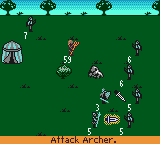
Heroes of Might & Magic is not too complicated without a keyboard and mouse. Even though it’s originally a PC game, the game’s interface is workable if convoluted. It uses A/B to confirm/cancel, with the Select button holding the ability to switch between towns or heroes. So it’s that weird kind of game where you’ll be pressing Select a whole bunch. The game is also buggy. I had to stop playing the game because the AI kept casting Berzerker on my multi-headed snakes; this caused them to get stuck in an endless animation loop, preventing me from progressing further in the game. In all honesty, I was kind of relieved to get an excuse to stop playing.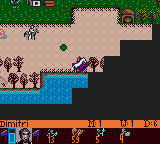 There is neither campaign mode, nor multiplayer. The only things available to play are skirmish maps. You don’t even get to choose your starting race.
There is neither campaign mode, nor multiplayer. The only things available to play are skirmish maps. You don’t even get to choose your starting race.
Strategies are inexistent. You don’t really even need to limit what you buy, since you easily get enough cash every week to buy everything you need. The heroes’ placement is ultimately irrelevant, since the maps are so big. Five units on a ginormous map can’t properly convey strategies. Your heroes just find one another, and attack one another. That’s it. When they attack one another, the hexagonal grid fighting strategy is way less complex than it should. Mostly because the game stacks your units. You can’t bring more than five different types of units with your army, and there are harsh limits on the number of heroes you can have in the field. What invariably happens is that you then build one gigantic army that moves around all over the map, steamrolling without any strategy every goon placed on the map in front of the treasures. That’s all fine and good, but you’ll be spending most of your time playing that game just shuffling units from your town to that army. It’s spring-cleaning video gaming.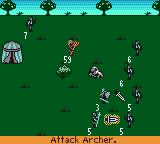
I liked Heroes of Might & Magic 3 on PC having played it hot-seat multiplayer with friends. Its mechanics lends itself well to a co-op game. It is a fun experience playing turn-by-turn with a beer while having a chat, even with all its anemic strategy. You’ll accept a lot of bullshit when playing with a friend. The Game Boy could have recreated that nice, no frills experience with a nice hot-seat multiplayer mode. It would have been perfectly suited to play that game with a friend. You would just take turns holding the console. Instead the game has no multiplayer of any kind. Your only option is playing against the AI in skirmish maps. No campaign, no multiplayer, no choosing your starting race even. Symptoms of an unfinished game.
Which brings me to my main point of contention with the game. Play it long enough (and when I mean long enough, I mean more than an hour) and you’ll bump into one of the Game Boy Color’s flaw: it can’t really do artificial intelligence. As much as this game’s gameplay is not conducive of any strategy, it does not matter. All the CPU does is move back and forth, barely buying any units, waiting to be trounced by your armies. There’s no challenge to this game, even on the supposedly hard maps. Most other Game Boy Color games hide their non-existent AI behind the mechanics of their game. Heroes of Might & Magic, being a port of a PC game, gets no such luxury. Every aspect of the game could be kind-of ported to the GBC, except the AI.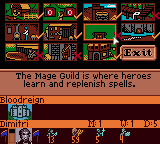
There is maybe one hope in terms of AI: the Game Boy War games. Made by Nintendo, and known here as the Advance Wars series, the games started on the Famicom and moved to Game Boy from there but were never released outside Japan until the GBA games. They are fun, simple turn-based strategy games that hide their shortcomings very well. I have yet to play any of the Japan-only GB Wars games, and look forward to see if they have a reasonable difficulty curve and an interesting AI.
Conclusion
Heroes of Might & Magic has many faults, with the weakness of the AI and the absence of hot-seat multiplayer being fatal to making the game any good. It is essential because of how apparent those shortcomings are and because it was published in its unfinished state anyway.
This article was first published on the .
This article was last modified on the .